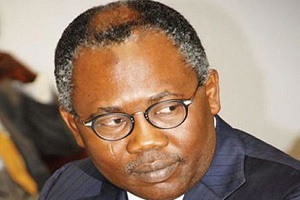Former Attorney-General of the federation and Minister of Justice, Mohammed Adoke, has asked the Federal Capital Territory High Court to stop his arrest by security operatives in Nigeria and across the country’s borders.
In an application challenging an April 29 order for his arrest, Adoke asked the court to grant his request in the interest of justice and fair hearing.
The court had on April 17 granted an earlier order for the ex-minister’s arrest for evading trial.
On April 24, Adoke filed an application challenging the order.
In his latest application, Mr Adoke said the second arrest warrant by the same court amounted to an abuse of court process. He asked the court to nullify the order.
To further prevent his arrest for his alleged roles in the Malabu OPL 245 scandal, Adoke also made an ex-parte application to stop the federal government from making further attempts at arresting him.
The ex-parte motion which can be granted without hearing from the other parties, was dated June 20.
Justice D. Z. Senchi had on April 17 ordered the arrest of Adoke alongside former Minister of Petroleum, Duazia Louya Etete (aka Dan Etete) and four foreigners, Raph Wetzels, Casula Roberto, Pujato Stefano, and Burrato Sebastiano.
The order followed their alleged involvement in the N1.1 billion Malabu scandal.
The court order followed their failure to turn up for their arraignment in a fraud charge relating to the Malabu Oil scandal.
Ruling on the ex-parte motion filed by the Economic and Financial Crimes Commission (EFCC) on April 17, Justice Senchi ordered that the Nigeria police, the INTERPOL and any other law enforcement agency should arrest them anywhere they were found.
However, in a motion on notice filed before the court through his lawyer, Mike Ozekhome, Adoke asked the court to vacate the order for his arrest on the grounds that the court lacked the jurisdiction to have granted the order in the first instance.
The EFCC had since 2017 pressed charges against Shell Nigeria Exploration Production Co. Ltd, Nigeria Agip Exploration Limited, Eni Spa, Raph Wetzels, Casula Roberto, Pujato Stefeno, Burrato Sebastiano, Mr Etete, Mr Adoke, Aliyu Abubakar and Malabu Oil & Gas Limited.
In the suit marked: FCT/HC/CR/124/17, all the defendants repeatedly failed to appear before the court.
Following their repeated absence in court, the EFCC through its counsel, Aliyu Yusuf, brought a motion praying the court for a warrant of their arrest, and an order for leave to execute the warrant outside of the jurisdiction of the court.
On April 17, according to the EFCC, Justice Senchi granted the prayers of the anti-graft agency, and ruled that the Nigeria Police, the INTERPOL and any other law enforcement agency ”should arrest them anywhere they were found including outside jurisdiction of the Federal Capital Territory, (FCT) High Court”.
Although Etete has not appeared in a Nigerian court, his lawyer has appeared during trials at the Italian court.
The Nigerian trial was adjourned to July 11, 2019, for further hearing.
The Malabu scandal involved the transfer of about $1.1 billion by oil multinationals, Shell and ENI, through the Nigerian government to accounts controlled by Etete.
From accounts controlled by Etete, about half the money ($520 million) went to the accounts of companies controlled by Abubakar Aliyu, popularly known in Nigeria as the owner of AA oil.
Anti-corruption investigators and activists suspect he fronted for top officials of the Goodluck Jonathan administration as well of officials of Shell and ENI.
The transaction was authorised in 2011 by Jonathan through some of his cabinet ministers including Adoke. The money was payment for OPL 245, one of Nigeria’s richest oil blocks.
Although Shell and ENI initially claimed they did not know the money would end up with Etete and his cronies, evidence has shown that claim to be false.
Shell, Eni, Etete, Aliyu and several officials of the oil firms are being prosecuted in Italy for their roles in the scandal.
Source: THISDAY













